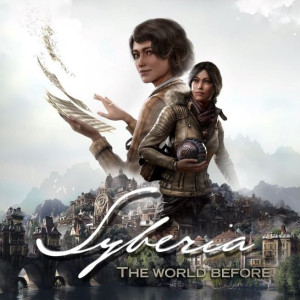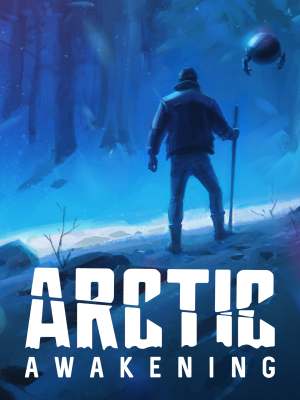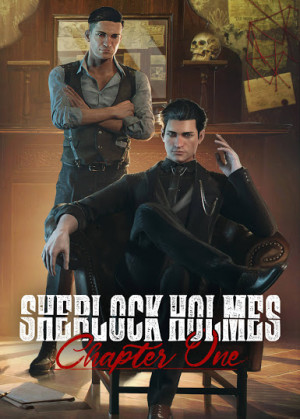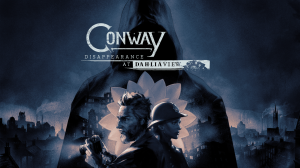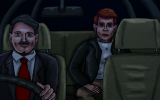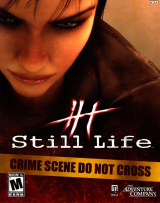Review for Syberia: The World Before
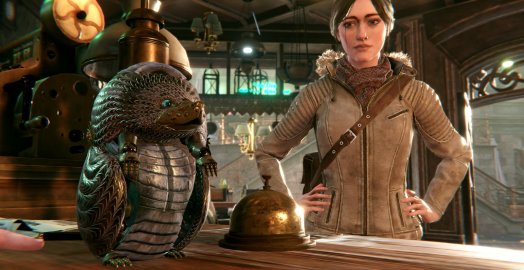
In 2002, Belgian comic book artist and game designer Benoît Sokal introduced us to Kate Walker, an ambitious lawyer sent to oversee the disposal of the estate of a mechanical genius. In her pursuit of the mysterious Hans Voralberg, Kate entered the pleasantly melancholic world of Syberia, in which she visited European-inspired cities seemingly forgotten by time, interacted with marvelous automatons tarnished by age, and encountered creatures from myths and legends as she transitioned from a repressed lawyer into an adventuress always looking toward the horizon. Two sequels and twenty years later, Microids (and developer Koala Games) returns with Sokal's final game, Syberia: The World Before. With her previous journeys behind her, Kate must now confront the question of whether her travels have brought her purpose or left her empty and alone. Sometimes tragic, sometimes hopeful, but always beautiful, this latest installment is both a fitting close to one chapter in Kate's life and hints at possibilities yet to come.
I fell in love with this game right away. That's important to note, because when The World Before was first announced, I was skeptical, as I suspect many Syberia fans were. That’s because the ill-fated third game in the series had left such a poor taste in my mouth, to the point where I almost wished the franchise would end there. Then Microids released the playable prologue for Kate's fourth adventure, and while it was still rough around the edges at that point, it hinted at enough possibilities that I became cautiously optimistic. Having now completed the full game, I feel confident in saying this is the game fans have been waiting for since the Syberia series began. As a poignant reflection on Kate's growth as a character, however, it will best be appreciated by longtime fans.
As we join Miss Walker this time around, she has been imprisoned for some time in a Russian salt mine, forced to toil for ivory and lost artifacts following the events of the previous game. The glamour of her earlier tales is long gone, replaced only by the harsh reality of her present situation. Already gaunt and sunken-eyed, in the opening moments she receives the devastating news of her mother's passing. It's a revelation that drives her to her knees with grief and sets the stage for everything to come, as Kate, for the first time, must deal with everything she's lost.
The themes running through The World Before are powerful. Kate is forced to reflect on her choices, and even her identity. Has she been chasing trains all this time? Is it time to grow up, return to New York, and accept the consequences of her actions? Only a promise to her girlfriend keeps her in Europe following her dramatic escape from the salt mine, in which she saw a painting of a young woman who could have been her own doppelgänger from the 1930s. Now Kate is determined to track down the mysterious woman, even as life threatens to unravel around her. The woman in question is named Dana Roze, and as the game’s other playable protagonist it is in her story, told at points across the twentieth century, that Kate hopes to find answers and meaning. Dana, a Vageran (the game's analog for the Jewish people) is living through the troubled, prejudiced times of World War II and must confront the Brown Shadow (a stand-in for the Nazi party).
Dana’s story starts optimistically. She is a young musical prodigy who, as the game opens, has the honour of playing a grand mechanical piano in the town square of the city of Vaghen in the fictional European country of Osterthal. The piano was constructed by none other than Hans Voralberg, and it prompts a series of automaton musicians to appear when played correctly. The happiness of her recital doesn't last, however, as afterwards Dana returns to her parents’ shop, where the Brown Shadow throw a brick with an insulting message through the window. As Dana's tale progresses and war looms, we see her gain things in life – a new vitality, a place at the music academy, friends, a man whom she adores and who loves her in return – only to see each of them stripped away.
Meanwhile, in 2005, Kate is following in Dana's footsteps, trying to learn who the woman from the past was and what became of her. Her journey takes her to Vaghen and its surrounding environs as well, and it's intriguing to see these places from two different time periods. Some locales like a mountain tavern seem untouched by the intervening decades. Others like the musical square have seen an invasion by trendy shops that stand garishly next to the decayed splendour of the city's heyday. Towering stone buildings, accented in brass and trimmed with sculptures both animate and inanimate, form the core of the city. The Art Nouveau sites are stunningly realized and showcased fantastically in gentle light filtering from the sky above, or by the glints of the sun setting at the end of a day.
No empty dioramas, the urban areas of Vaghen are populated with background extras talking, shopping, or just getting a bite to eat. It is a world that feels vitally alive, though the crowded streets give way to quiet reflective places like a gloomy cemetery and the wilderness encircling the city, which sits at the base of a great mountain range encrusted by lush forest vegetation and may or may not be home to a hidden race of Goruns – abominable snowmen!
Accentuating the visuals is the world's soundscape. Never too brash or in-your-face, there is an ambience to the many locations the heroines visit that feels right. The city has the gentle hubbub of a real place, automatons whir and clank when set into motion, and the more natural areas are accented with the sound of wind through branches or the roar of a waterfall in the distance. Accompanying and complementing the action is the game's excellent score. Tunes from the earlier installments in the Syberia series are carried over here, with Kate's melancholy-but-hopeful piano theme being instantly recognizable, but the soundtrack is further expanded with new themes for the characters from the past. Dana's seems brighter at first, but with an ominous undercurrent that foreshadows the tragedies she is to face.
Rounding out the audio are the vocal performances, headlined by Sharon Mann, who has voiced Kate Walker throughout the series and does so brilliantly again here. Dana too is a standout; newcomer Emilie Rault gives Dana's voice a gentle fragility that belies the internal strength she finds as her own tale unfolds. In fact, nearly all of the performances are strong, and obvious care has been taken with the lip sync given to the emotive character models. The one exception for me was that of Oscar, Kate's long-suffering automaton companion and her only friend. His previous voice actor has been replaced this time, and while it's not at all bad per se, it just doesn't sound like the formal, officious, stilted automaton of old, the one who would always greet Kate perfunctorily as “Kate Walk-er.” Now the character sounds much more emotional and nervous and more like C-3PO of Star Wars fame than the mechanical companion existing fans have come to know and love.
Another miss with Oscar comes in his utility throughout the game. As events begin, the only thing Kate has left of Oscar is his automaton heart, which also contains his memories and personality. One of her early goals is to find a new host automaton to put the heart into. I had anticipated this would be a source for some interesting puzzles involving swapping the heart into different mechanical bodies. Regrettably, this potential goes largely unrealized, though this a minor quibble in the grand scheme of things. With the story focused on Kate's internal struggle, more shenanigans with Oscar likely would have gotten in the way.
Even with Oscar at her side for part of the game, Kate's journey is largely a solitary one, though she meets a few new faces along the way, such as the kindly woman running the guesthouse she's staying at, and the put-upon rector of the music academy who fears he has to close the school due to an ongoing inability to pay the bills. Meanwhile, Dana's life is full of colourful characters, including her doting parents; young Leni Renner, a waitress who goes on to become a resistance fighter; Leon Kobatis, the man she falls in love with; and Junta Steinhoff, an independent film developer with a secret. At various times, some of these supporting characters even become playable themselves. There are also a few clever instances where it’s possible to switch freely between Dana and Kate to learn things in the past in order to apply them in the present, such as the location of a hidden key used to unlock an important trunk.
As far as the gameplay is concerned, I very much had the feeling the developers were inspired by Life Is Strange, or possibly Telltale's “story” games to a lesser extent. Many of the challenges involve direct manipulation of objects, with on-screen prompts to show what needs to be done. For example, when Kate needs to use a Voralberg key, a close-up is shown of the locking mechanism and a circular arrow appears. Clicking and dragging the mouse or using a game controller to perform a circular movement causes the arrow to fill up and the key to turn at the same time. Similar actions are performed for sliding open some stubborn doors, popping the latches on luggage, and working with various complex contraptions.
Along with these direct environmental interactions, there are a decent number of inventory-based puzzles to solve. These have been streamlined from a typical point-and-click experience, however, as the game decides when an inventory object can be used. In these situations, interacting with a hotspot in the world will display a small circular overlay showing one of Kate’s or Dana's items. Arrows on either side of the display can be used to scroll through all your items to find the one to be employed, assuming you’ve acquired it already. If not, anything you need will never be far away.
Difficulty throughout the game runs the gamut from easy to moderately challenging. Some obstacles simply require interacting with the correct hotspot, highlighted by small white circles appearing on-screen when the mouse is moved near to them or when the active protagonist draws close. Others deal with the operation of various machines such as a telescope, radio, or various chests with intricate locking devices. In certain situations, information must be cross-referenced, like when Dana needs to decipher short Morse code strings during her war years. There's a good variety of things to do in the substantial fourteen hours of play time, and the balance between puzzles and story felt spot-on to me.
One nice bonus, if you do get stuck, is a visible hint button that slowly fills up as you perform different interactions, prompting you to try things on your own before being able to access a hint. In some cases hints even have multiple tiers, starting with a general prompting and becoming increasingly more specific.
The World Before keeps track of your current objectives by storing them in an easily accessed journal. Players are also rewarded for exploring beyond the beaten path with the introduction of optional side quests. These comprise the likes of exploring an area more thoroughly, talking to people to see how they're doing, or researching the events of the day to get a deeper understanding of the world. The journal also has a page from which inventory items can be viewed, and another that provides additional backstory, with more notes becoming unlocked as the story unfolds.
A good deal of time is spent in talking to other characters, and here too The World Before appears to have been inspired by other modern adventures. In addition to standard choose-every-option dialog trees, there are occasionally minor choices interjected throughout. I've only played the game through once, but I didn't get the impression that making different choices would significantly alter events. Even so, it’s a nice touch that caused me to think about the options I was choosing rather than just clicking through them by rote.
Not only do Kate and Dana talk to others, at various points they talk to themselves, and not in the typical adventure game fashion of “I can't get through that door because I don't have the key.” I'm referring here to what the game calls “Introspection.” Occasionally hotspots appear in the environment that, when used, cause the current protagonist to stop and take things in, the camera serenely drifting around the scene to showcase different areas. In these moments, Kate and Dana reflect to themselves, in detail, on the things they've just experienced, what they're going to do next, and their general emotional state. It's so heavy-handed that it’s a bit of a blight on the otherwise excellent writing. Fortunately these sequences are few and far between.
Animations abound, and the developers have clearly taken advantage of motion capture technology. Coupled with the highly detailed models, the characters pull off some very deft and oftentimes subtle emotional nuances. Whether it’s Kate's lip-trembling breakdown at the loss of her mother, or Dana's shoot-and-duck actions during a wartime cutscene, the characters move with a believability that stays mostly clear of the uncanny valley. Kate's actions in the closing moments of the game are particularly moving and are evocative of the finale of the series’ first game.
One minor drawback to The World Before is that it uses a single auto-save system, although you can create three different profiles from the main menu. Fortunately, to ameliorate the saving issue somewhat, an autosave always happens when switching locations in addition to specific moments of the game's choosing. This affords some control over when you record your progress, which is definitely needed in an adventure of this length.
Syberia: The World Before is more of an emotional journey than a physical one for its two heroines. It primarily explores who Kate is as a person, but the link between the two women, separated by time, is satisfying when ultimately revealed. As with the first Syberia game, this one ends with a moment that feels like both an appropriate ending and an excellent launching point for further adventures to come, though sadly any new tales will have to be told without the oversight of Benoît Sokal, who passed away before this game was complete.
It seems fitting, at least, that Sokal’s final adventure should be so strong. The production is first-rate, as you’d expect of a new Syberia game, with impressive visuals, moving music, and engaging animation. But the story too is told by developers confident in their craft. The World Before is at times sorrowful, moving, and humorous. It's made to appeal most to longtime fans of the series who have a familiarity with and affection for Kate Walker and her world. New players will doubtless gravitate more towards Dana's tale, as it's fresh and told from the beginning, but as with Kate's own experiences, it is best to delve into the past and play the previous games first. Only then can the true majesty of this masterpiece be fully appreciated.


